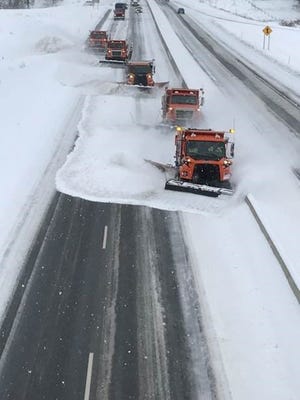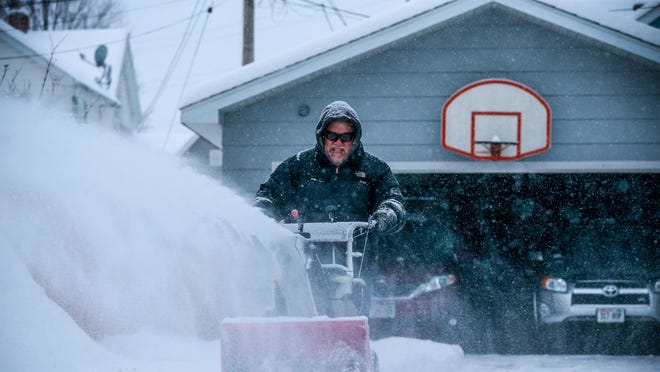The cost to clear roads during a snow storm? For Marathon County, it's $100,000 or more.
 Laura Schulte
Laura Schulte
From the perspective of a highway commissioner, that's not just a bunch of snow falling from the sky.
It's a sign that more taxpayers' money will be depleted from a road-clearing budget, and that dozens of plow drivers will work long, exhausting shifts.
And just what does a snow storm cost? A lot, said James Griesbach, the highway commissioner for Marathon County.
The county typically has 41 employees working during a snow event, driving plows and graders. Each of those employees works about 12 hours, Griesbach said, which comes out to about $60,000 in wages, without any overtime. Add overtime, which includes any time worked on weekends, and salt and sand, and the total rises to about $100,000.
That's for cleaning about 2,100 miles of county, state and federal highways in Marathon County, the largest county in Wisconsin geographically.
That doesn't include the cost of city plowing crews, which handle streets in town that aren't part of the county's routes.
And there's no dollar value for the toll it takes on workers, who are out plowing up to 13 hours to make sure that roads are passable not only for commuters, but for emergency personnel.
"The guys get tired, they just get physically wore out," he said. "We bring everybody in at anywhere from 3 to 4 in the morning, and then we'll run them through the rush hour."
RELATED: Follow along for live updates as winter storm hits the state
RELATED: More snow, hazardous travel expected early this week
In preparation for Tuesday's storm, Griesbach said he pulled drivers off the roads on Monday afternoon and sent them home to rest. Then a small crew worked through the early evening and night hours Monday and into the early morning, plowing main roads like State 29, U.S. 51 and Interstate 39. Then he brought in a larger crew around 3 a.m.
"They'll start plowing and they'll plow all day until 5 or 6 at night, depending on the storm," Griesbach said. "By then we'll get through the rush hour and we'll bring some other people back in if we have to keep plowing. But we won't have a full fleet going through the night."
There's always a concern that the budget for winter road cleanup will run out because of large storms in January and February, creating a funding problem for storms in November and December. A snow storm that slammed Wisconsin last April — clogging roadways statewide and making travel extremely hazardous — cost Marathon County $308,000 in plowing, Griesbach said.
That was just one of the state's 72 counties.
The county is reimbursed for taking care of the state and federal highways, and then contingency money from the Marathon County budget helps, if needed.
As for the amount of time it takes for plows to move through the county — some routes can take up to four hours to complete — Griesbach said that he's thankful that residents are typically patient and he receives very few complaints.
"I think the residents of the county understand," he said. "They understand we're living in Wisconsin."

A winter weather reminder: Don't tailgate snow plows
Motorists must give plows time and space on the road, said Marathon County Highway Commissioner James Griesbach. If you can't see the mirrors on the plow, the driver can't see you, which can create a hazard. Don't follow too close to snow plows, and watch for plows that are backing up, especially near or in an intersection.
"The great majority of our accidents that we have are rear-ends or because people are following too close," he said. "And when something like that happens, it takes the truck out of commission."